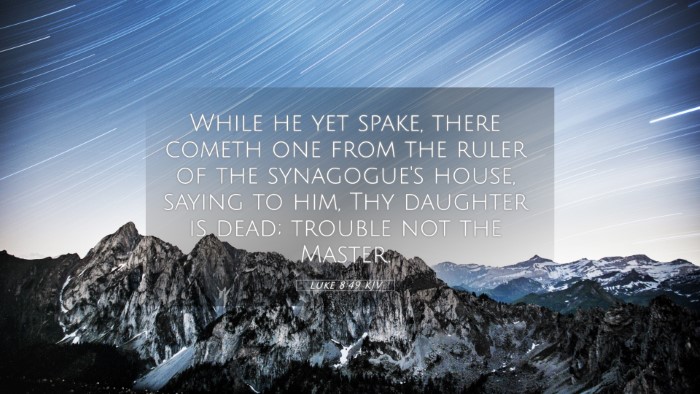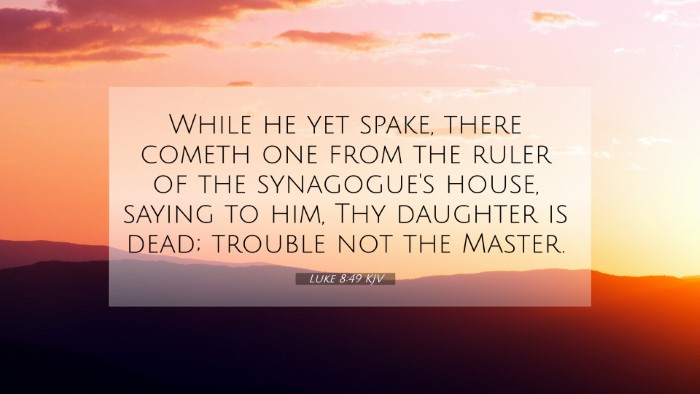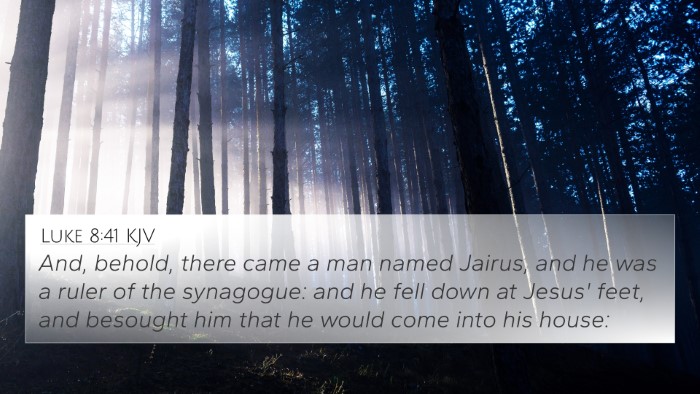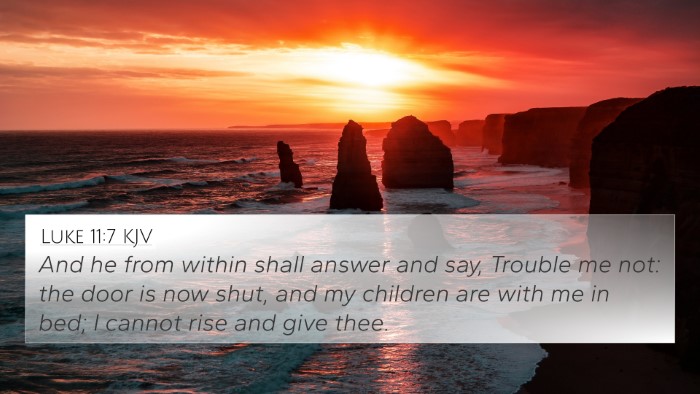Understanding Luke 8:49
Verse: Luke 8:49 (KJV) - "While he yet spake, there cometh one from the ruler of the synagogue's house, saying to him, Thy daughter is dead; trouble not the Master."
In this verse, Jesus is approached by a messenger who delivers devastating news to Jairus, the ruler of the synagogue—his daughter has passed away. Luke 8:49 encapsulates a moment of despair but also hints at the profound faith that Jairus exhibited earlier in his request for Jesus to heal his sick daughter. Let's delve deeper into the meaning and implications of this verse by drawing insights from various public domain commentaries.
Context and Significance
According to Matthew Henry, the context of this scripture is vital. Jairus, a man of influence, initially seeks out Jesus in great desperation for his sick daughter. Henry emphasizes that the arrival of the messenger signifies a moment of hopelessness not only for Jairus but also serves to highlight the power of belief in Jesus during crises.
Albert Barnes offers insight into the societal implications of this moment. He notes the importance of Jairus's position as a ruler of the synagogue, suggesting that his willingness to turn to Jesus signifies a radical departure from societal norms, underscoring the theme of faith transcending societal barriers.
Additionally, Adam Clarke discusses the emotional weight of the message. The phrase "trouble not the Master" serves as a poignant reminder of human limitations. Clarke interprets this to indicate a lack of understanding of Jesus's power over death itself, as the message reflects disbelief that Jesus can reverse this situation.
Thematic Connections
Luke 8:49 is interwoven with several themes found throughout the Bible. Below are some key themes and corresponding cross-references:
- Faith amid Despair: Hebrews 11:1 - "Now faith is the substance of things hoped for, the evidence of things not seen."
- Power over Death: John 11:25-26 - "Jesus said unto her, I am the resurrection, and the life: he that believeth in me, though he were dead, yet shall he live."
- Hope in Crisis: Romans 8:31 - "What shall we then say to these things? If God be for us, who can be against us?"
- Jesus as Healer: Matthew 9:35 - "And Jesus went about all the cities and villages, teaching in their synagogues, and preaching the gospel of the kingdom, and healing every sickness and every disease among the people."
- Divine Intervention: Psalm 46:1 - "God is our refuge and strength, a very present help in trouble."
- Trust in God’s Plan: Proverbs 3:5-6 - "Trust in the Lord with all thine heart; and lean not unto thine own understanding."
- Jesus Overcomes Genuine Crisis: Luke 8:54-55 - "And he put them all out, and took her by the hand, and called, saying, Maid, arise. And her spirit came again, and she arose straightway."
Insights from Commentators
This verse serves not merely as a narrative element but as a theological reflection of the nature of faith and the anticipation of Jesus’s miraculous power. The commentaries together illuminate the multifaceted relationship between despair and hope, contrasting human frailties with divine capabilities.
Matthew Henry notes, "When we are brought to the point of despair, we must remember the power of Christ exceeds our circumstances." While Albert Barnes emphasizes the necessity of transcending societal expectations and norms in the pursuit of Jesus, showcasing that no status can shield one from heartache.
Adam Clarke further comments on the heart-wrenching aspect of this message—a reflection of how often humanity underestimates Jesus’s ability to restore life and hope, especially in the midst of despair.
Conclusion
In conclusion, Luke 8:49 serves as a critical point of reflection for readers seeking deeper understanding of faith and crisis in the light of Jesus's authority and love. The panic of Jairus reflects a relatable human experience while providing a moment for Christ's unparalleled power to manifest. This verse opens the door for further exploration of biblical connections and thematic cohesion across scriptures.
Further Study and Resources
For those interested in deepening their understanding and enhancing their Bible study techniques, consider utilizing tools for Bible cross-referencing, such as a Bible concordance or a comprehensive Bible cross-reference guide. These resources can offer pathways to uncovering connections between Bible verses and understanding the thematic Bible verse connections present throughout Scripture.
This exploration encourages believers to seek Bible verses that relate to each other, enhancing their journey of faith and understanding of God's word. By exploring Bible chain references and employing effective cross-referencing Bible study methods, one can unlock the depth of Scripture, fostering a fuller grasp of the Biblical narrative.








